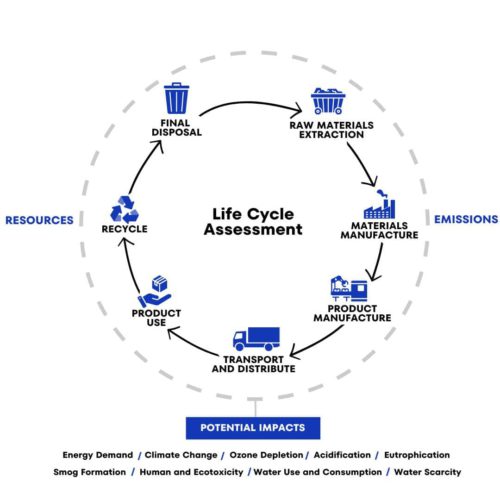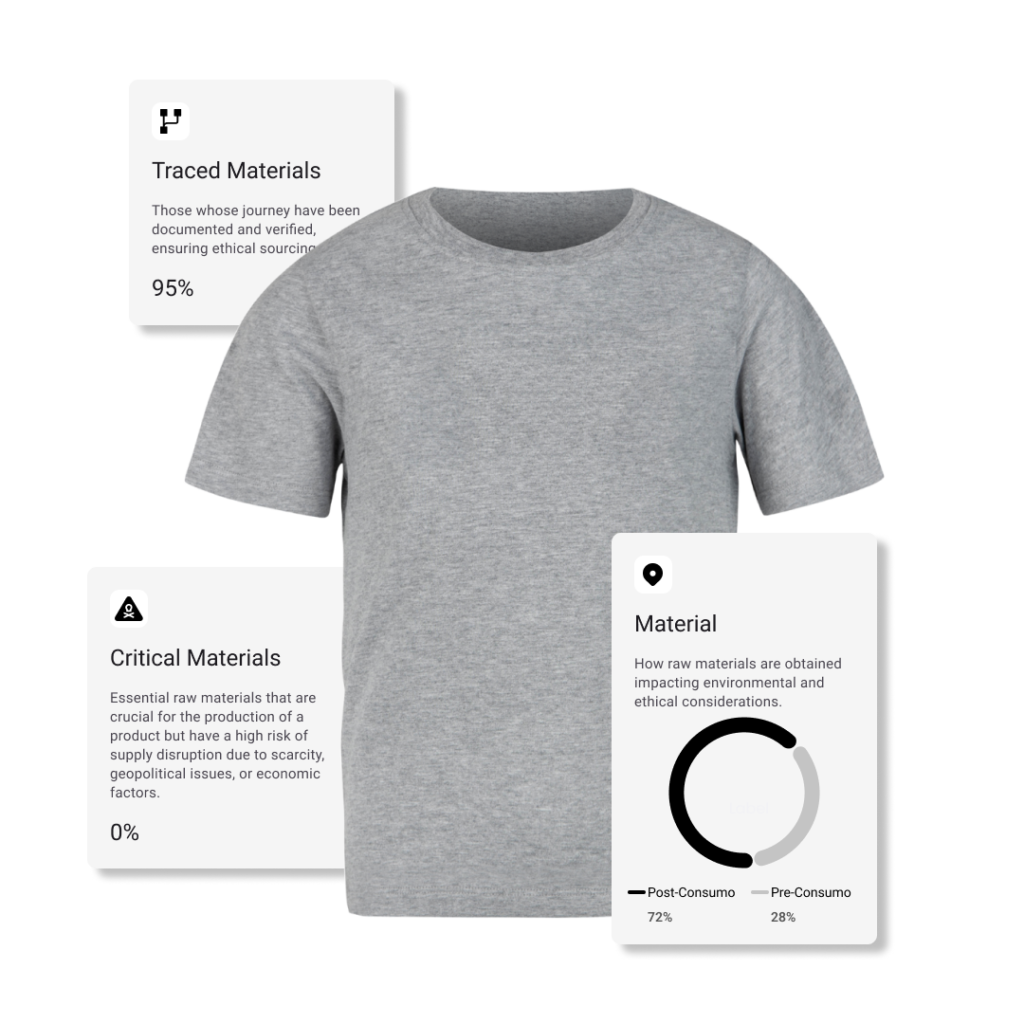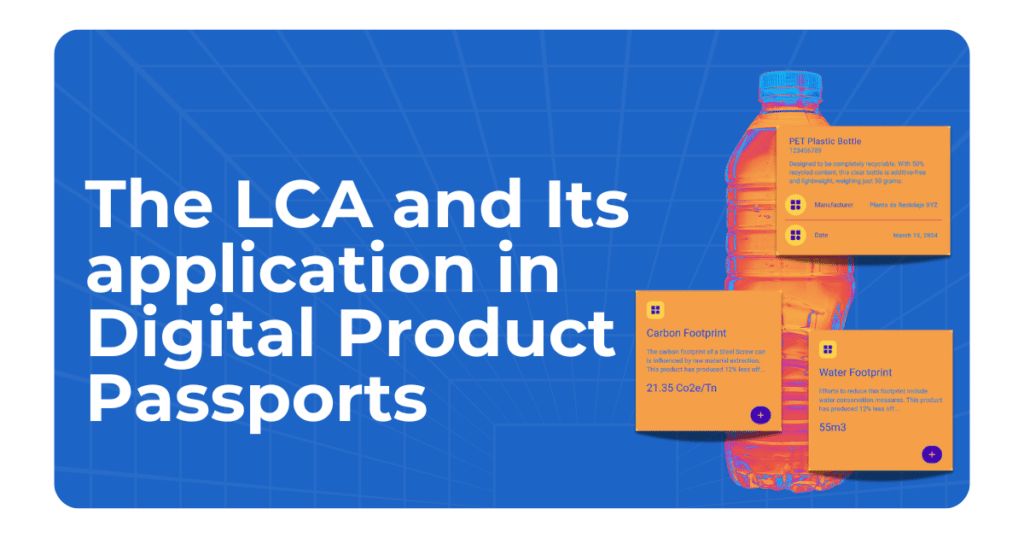Life Cycle Analysis (LCA) and its Strategic Role in Digital Product Passports (DPP)
Life Cycle Analysis (LCA) and its Strategic Role in Digital Product Passports (DPP)
In a global context increasingly focused on sustainability, environmental traceability and product transparency have become both regulatory and market requirements. In this context, Life Cycle Assessment (LCA) is emerging as a key tool for measuring and managing the environmental impact of products, processes, and services throughout their entire life cycle.
Digital Product Passports (DPP), promoted by the European Commission within the framework of the Pacto Verde and the Ecodesign for Sustainable Products Regulation (ESPR), require accurate, verifiable, and structured environmental data. This is where LCA takes on a strategic role: it provides the scientific basis necessary to feed these passports with solid, comparable information based on international standards.
In this article we will explore what LCA is, how it is technically applied, and what its determining role is in the development of Digital Product Passports. In addition, we'll address regulatory implications, business benefits, and best practices for integrating both concepts into the value chain.
What is Life Cycle Assessment (LCA)?
What is Life Cycle Assessment (LCA)?
Life Cycle Assessment (LCA) is a methodology that assesses the environmental impact of a product, process, or service. It does so by considering all stages of its existence: from the extraction of raw materials to final disposal or recycling.
Unlike other tools, digital LCA is not limited to measuring a single indicator. It assesses multiple impact categories such as greenhouse gas emissions, water consumption, energy use, and waste generation. Furthermore, it is based on international standards, primarily ISO 14040 and ISO 14044. These standards ensure that the analysis is consistent, comparable, and verifiable.
The main objective of LCA is to provide useful information for making more sustainable decisions. It allows for the identification of critical points and opportunities for improvement at any stage of the product life cycle.
Phases of Life Cycle Analysis
Phases of Life Cycle Analysis
The digital LCA is composed of four main phases, standardized by the standards ISO 14040 and ISO 14044. These phases ensure a structured, transparent, and repeatable approach. Each is described in detail below.
Definition of goals and scope
In this initial stage it is specified what is going to be analyzed and for what purpose. In addition, the following are delimited: system limits, that is, to what extent the processes involved will be considered. It also defines the functional unit, which represents a reference measure to fairly compare alternatives, such as “1 kg of product” or “1 use of the service”.
Life Cycle Inventory (LCI)
In this phase, quantitative data is collected on all entrances and exits of the system. This includes resources consumed (water, energy, raw materials) and emissions generated (CO₂, solid waste, effluents). The inventory must cover each stage of the life cycle: extraction, production, transportation, use, and end-of-life. It is also essential to use representative, reliable, and traceable data.

Impact Assessment (LCIA)
With the inventory data, a conversion is made to environmental impact categories. Each input or output translates into measurable effects such as global warming, soil acidification, human toxicity, and others. This phase helps visualize which parts of the system cause the most damage, allowing for effective targeting of improvements.
Interpretation
This last phase is crucial. All the results obtained are analyzed, and the critical points and useful conclusions are formulated. In addition, the study's consistency, sources of uncertainty, and limitations are examined. If the analysis is used for decision-making, this stage should include clear and justified recommendations.

Life Cycle Assessment (LCA) Regulations
Life Cycle Assessment (LCA) Regulations
The Life Cycle Assessment (LCA) It is based on a set of international standards developed to ensure the quality, transparency and comparability of environmental studies. These standards are issued by the International Organization for Standardization (ISO) and constitute the methodological basis for any rigorous and verifiable analysis.
ISO 14040: Principles and general framework
The norm ISO 14040 Establishes the principles, framework, and overall structure of an LCA study. It defines the four essential phases: definition of objectives and scope, inventory analysis, impact assessment, and interpretation. This standard provides an overview of the process and ensures a consistent approach across all studies.
ISO 14044: Requirements and guidelines
Complementing ISO 14040, the ISO 14044 Details the technical requirements and methodological guidelines necessary to implement digital LCA. It includes criteria for data selection, load assignment, uncertainty assessment, and result validation. It also requires justification of key decisions, which improves the transparency of the study.
ISO 14067: Carbon footprint of products
The ISO 14067 focuses on a specific category of the ACL: the carbon footprint calculation. This standard defines how to quantify and communicate the greenhouse gas emissions associated with a product, using the principles of life cycle assessment. Its application is key for sustainability reporting, environmental labeling, and climate compliance.
ISO 14001: Environmental management systems
Although it does not directly regulate the LCA, the ISO 14001:2015 requires organizations to consider the life cycle perspective in its environmental management system. This involves analyzing the environmental impact of products and services from their conception to their final disposal, reinforcing the need to apply LCA as part of a comprehensive environmental strategy.

Practical Applications of Life Cycle Assessment (LCA)
Practical Applications of Life Cycle Assessment (LCA)
The Life Cycle Assessment (LCA) It's not just a theoretical tool. Its real value lies in its practical application in business, industrial, and regulatory environments. Thanks to its comprehensive approach, LCA enables strategic decisions based on real, quantifiable data. One of its most common applications is the product ecodesign. Companies use LCA results to redesign materials, processes, or packaging to reduce their environmental impact. This allows them to improve energy efficiency, minimize waste, and optimize resources from the initial development stages.
Another important application is the environmental comparison between products. Through LCA, it is possible to evaluate which of two or more alternatives offers better environmental performance. This capability is key to responsible purchasing decisions and to justifying the development of new sustainable products.
In the supply chain, the LCA identifies the most critical links from an environmental perspective. This allows for the implementation of specific improvements, such as supplier changes, logistics adjustments, or the use of clean energy in key processes.
In addition, ACV is widely used in the environmental communication, both in sustainability reports and in eco-labeled. Tools such as Environmental Product Declarations (EPDs) require a rigorous LCA as a technical basis. This strengthens a company's reputation and facilitates access to markets with strict environmental requirements.
Finally, its integration into Digital Product Passports (DPP) It makes all this environmental information available in a structured, accessible, and transferable manner throughout the product lifecycle. This not only supports the circular economy but also prepares organizations for compliance with future regulations.
Integration of LCA into Digital Product Passports (DPP)
Integration of LCA into Digital Product Passports (DPP)
The Digital Product Passports (DPP) They are digital tools designed to collect and communicate detailed information about every aspect of a product. They contain data on materials, manufacturing processes, energy consumption, reuse and recycling possibilities, and environmental footprint. In the European regulatory context, these passports are essential for moving toward a more transparent, efficient, and circular economic model.
The Life Cycle Analysis plays a strategic role within these passports. When integrated into the DPP, it provides a comprehensive assessment of a product's environmental impacts throughout all its stages. From raw material extraction to final disposal, digital LCA allows for accurate and standardized documentation of a product's environmental performance.
The inclusion of LCA from the design phase facilitates the identification of materials or processes with high environmental burdens. This analytical capability allows products to be redesigned before manufacturing, implementing specific environmental improvements from the outset. By recording this data in the DPP, a clear traceability of the decisions made and their environmental benefits is created.

How Blue Room Innovation Integrates LCA into Its Digital Passports
How Blue Room Innovation Integrates LCA into Its Digital Passports
In addition, the LCA strengthens the transparency of the product. Consumers, authorities, and business partners can access accurate, quantifiable, and verifiable information. This clarity in communication builds trust and positions the company as a leader in sustainability and environmental responsibility.
The life cycle approach also enhances the circular economyBy detailing the product's composition and environmental performance, LCA-enriched PPDs facilitate reuse, repair, and recycling. This reduces waste and optimizes resource use, extending the lifespan of the product and its materials.
Additionally, integrating LCA into DPPs helps organizations to comply with European regulations current and anticipate future legal requirements. It also facilitates access to recognized environmental certifications, which strengthen competitiveness in increasingly regulated and conscious markets.
Finally, having a digital passport supported by a lifecycle analysis allows companies make more informed and strategic decisionsThanks to this structured and objective information, it's possible to reduce costs, mitigate risks, and continuously optimize processes, all while improving the product's environmental profile.
At Blue Room Innovation, we integrate the Life Cycle Analysis in the development of our Digital Product Passports, CircularPass. This approach allows us to accurately assess the environmental impact of each product, component, or waste we track.
We collect and process input and output data throughout the entire lifecycle. From raw material extraction to final disposal, each stage is carefully analyzed. Once the calculations are complete, we obtain clear sustainability indicators, which are incorporated into the DPP and can be transferred throughout the supply chain.
This method improves the transparency, strengthens the consumer confidence and promotes the circular economy, facilitating the reuse and recycling of materials.
Want to learn how our solutions can help you meet your sustainability goals?
Experts in digital innovation at your service
Discover how Blue Room Innovation transforms ideas into digital solutions with real impact and commitment to sustainability.
Are you ready to be part of the change?
Follow us
Copyright © 2024 Blue Room Innovation Privacy Policy - Legal Warning - Cookies Policy

